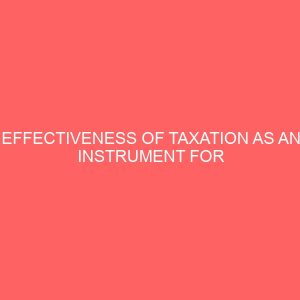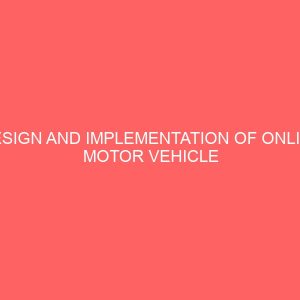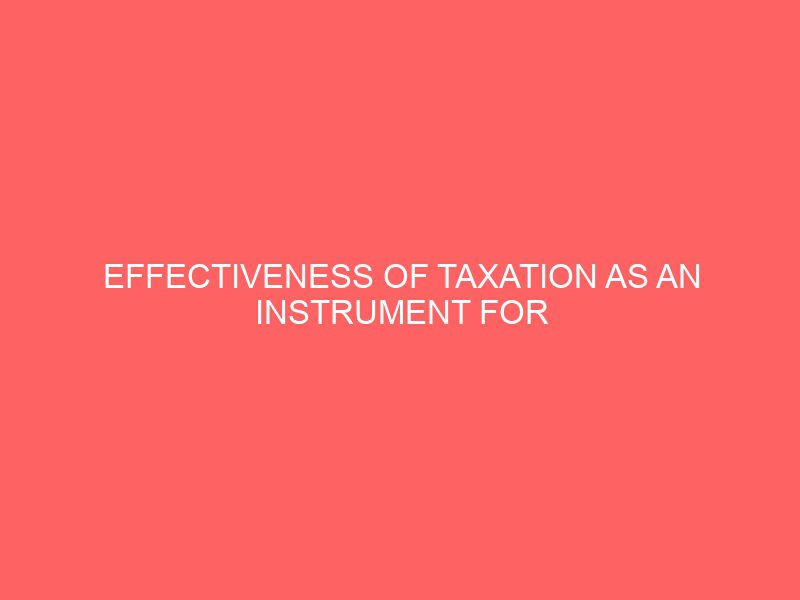Description
Chapter One
Introduction
1.1 Background of the Study
This project is on Effectiveness of taxation as an instrument for control of money in circulation. Government, all over the world needs tax to fund and control their economic activities and one of source of revenue is taxation. Taxation can be variously defined. Fundamentally however, it is a compulsory levy on income since the decision to pay tax is not that of the tax payers. According to Amaechina (1998:9), “taxation has been defined as a levy which a government imposes on the income of the citizens or corporation in a state for which the government gives no direct benefit to the taxpayer” or “a non-punitive but yet a compulsory levy by government on the properties and income of individual and corporation”. The government cannot build a school or a hospital personally for somebody because he has paid his taxes, but the money realized is used to finance general government expenditures.
The existence of taxation in Nigeria is linked with the era of the colonial master in the early 20th century. The introduction becomes necessary as a result of the enormous tasks facing the government. In Nigeria, tax system has undergone significant changes in recent times. The tax laws are being reviewed with the aim of repelling of obsolete provision and simplifying the main ones. Under current Nigeria law, taxation is enforced by the tiers of government that is local, state and federal government. The tasks have to do with how government can control its economic activities and how government can achieve the desired level of price inflation and deflation and how to control supply of money.
As the topic of this research work is “the effectiveness of taxation as an instrument for control of money in circulation” taxation constitutes significant impart as an instrument for control of money in circulation such as the effect on rapid rise in price on revenue, expenditure and credit; the extent to which the tax system may be effective in preventing or combating an inflation.
1.2 Statement of the Problem
The project titled effectiveness of taxation as an instrument for control of money in circulation is aimed at determining the nature of taxation and how it can be used to control the supply of money and regulate the economic activities in our country.
It is obvious that Nigeria being one of the developing nations of the world seriously faced with series of problems which includes;
- The extent in which the tax system has been inactive or ineffective in preventing or combating inflation.
- The probable effects of a rapid rise in prices on revenues and expenditure.
- The vicious circles of poverty (i.e. the gap between the rich and poor is too wide).Nigeria has one of the world’s highest economic growth rates, averaging 7.4% according to the Nigeria economic report released in July 2014 by the world bank. Poverty still remains significant at 33.1% in Africa’s biggest economy.
1.3 Objective of the Study
For the purpose of this study; the following objectives are expected to be attained:
- To determine how tax system can be effective in preventing and combating inflation.
- To ascertain the extent on which revenue and expenditure are probable effects of a rapid rise in prices.
- To determine and to use tax system to breach the vicious circles of poverty in our Country.
1.4 Research Questions
In order to achieve the objective highlighted above, the following research questions were formulated as follows:
- In what ways can tax be used to effectively prevent or/and combat inflation?
- The effectiveness of rapid rises in prices on revenues and expenditure
- The effect of vicious circles of poverty in Nigeria economy.
1.5 Research Hypotheses
HI: The extent to which tax system is inactive and ineffective in preventing and combating inflation.
HO: The extent to which tax system is not inactive and ineffective in preventing and combating inflation.
HI: There is significant effect of a rapid rises in prices, on revenues and expenditure.
HO: There is no significant effect of a rapid rises in prices, on revenue and expenditure.
HI: There is significant effect on tax system and supply of money with the vicious circles of poverty.
HO: There is no significant effect on tax system and the money with the vicious circles of poverty.
1.6 Significance of the Study
The study is important in such that:
(i) The outcome of this study would enhance the ability of the students offering course in taxation to understand the subject properly and help the researcher to obtain the award of bachelors of Science Degree in Accountancy.
(ii) The study would serve as an information bank for future research in the area of Taxation.
(iii) The findings of this research would help government officials to utilize taxation in Achieving desired goals.
(iv) It shall also serve as an eye opener to government of the present time that Taxation can be used as economic tool for the control of money in circulation in order to avoid inflation, control high cost of living and low standard of living.
1.7 Scope and Limitation of the Study
This topic, the effectiveness of taxation as an instrument for control of money in circulation should been expected to cover Nigeria (i.e. Thirty six (36) states and the FCT) but decided to limit it to some states of the federation, since the economy of every state of the federation is not the same and the same tax Act is applied throughout the Federal Republic of Nigeria.
Due to financial handicap, distance (Landmass) and the constraints and the attitude of the respondents, most of them were either not available or incorrectly completed the questionnaire given to them. The irrational behavior of human beings who react differently as same were willing to give the needed information, others were reluctant or refused to co-operate even under several persuasion.
1.8 Definition of Terms
Some technical term, which features in this work are defined to enhance letter understanding of the research work?
Taxation: Taxation refers to compulsory levy imposed on private, individual, and institutions or groups by the government
Tax: Tax is the money paid by the citizens, according to their income, value of goods Purchased etc. to the government for public purposes.
Financial Handicap: This means shortage of money for an activity.
Tax Payer: People, group of people or companies that pays tax.
Vicious Circle: It is a situation in which one problem leads to another, which then makes the first one worse.
Inflation: This is when there is too much money in circulation.







